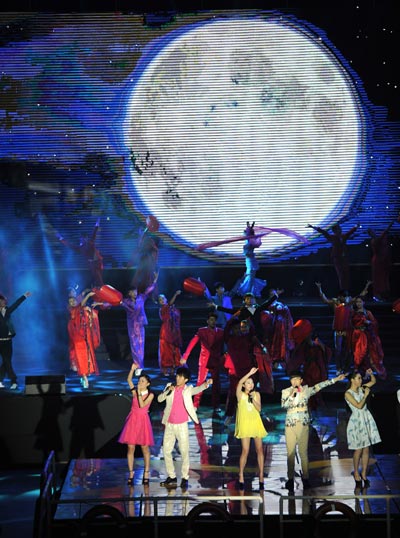 |
|
This year's CCTV Mid-Autumn Festival gala, filmed in Suzhou, Jiangsu province, kept a low profile in terms of lighting designs and the choice of artists. Photo provided to China Daily |
 |
| CCTV Spring Festival Gala canceled? Still a mystery |
 |
| CCTV tapping US talent pool for 2015 LunarNew YearGala |
"The regulations are not necessarily intended to cap the budget of a single gala, but rather to control the total number of such shows," says Cheng Xiaofei, a renowned TV critic and independent producer who earlier worked with Hunan TV.
In the past few years, gala shows have become a segment where competition between satellite channels has intensified. Initially, Hunan TV led the production of year-end gala shows. But soon enough other channels, such as Jiangsu TV, began to challenge its dominance over the televised events.
"Year-end shows sort of become a manifestation of the TV channels' overall production level, a way for them to market themselves and increase influence," says Cheng.
To create a better impression to advertisers and viewers, channels usually end up paying a lot of money to get A-listed celebrities.
"The money mostly goes to celebrities, with little left for the creative staff members, such as directors and scriptwriters. It's like the cooking materials are too expensive while the really important chefs are earning very little," media researcher Leng Song told China Daily in an earlier interview. Leng works for the major think tank the Chinese Academy of Social Sciences.
Star power alone can prove brutally unsustainable, says Cheng.
Fans may easily switch the channel after watching their favorite stars or may get bored of the too-frequent appearances of some people.
The government austerity drive has influenced decisions by channels.
Chinese TV stations used to be solely State-owned and rely on government subsidies. But in the past decade many leading channels have learned to play the markets, with influential programs bringing in considerable incomes. That's to say, Cheng says, many are spending their own money.
"To produce extravagant gala shows is part of their development strategy. It should be encouraged in a way," he says.
The effects should be left for the market to test and tell.
He was told by an official from Jiangsu TV last year that the channel had plans to halt its year-end shows because of their unsatisfactory performance, Cheng says. "If a program doesn't end well, the TV station will drop it anyway."
|
|
|
|
|
|
|
|
